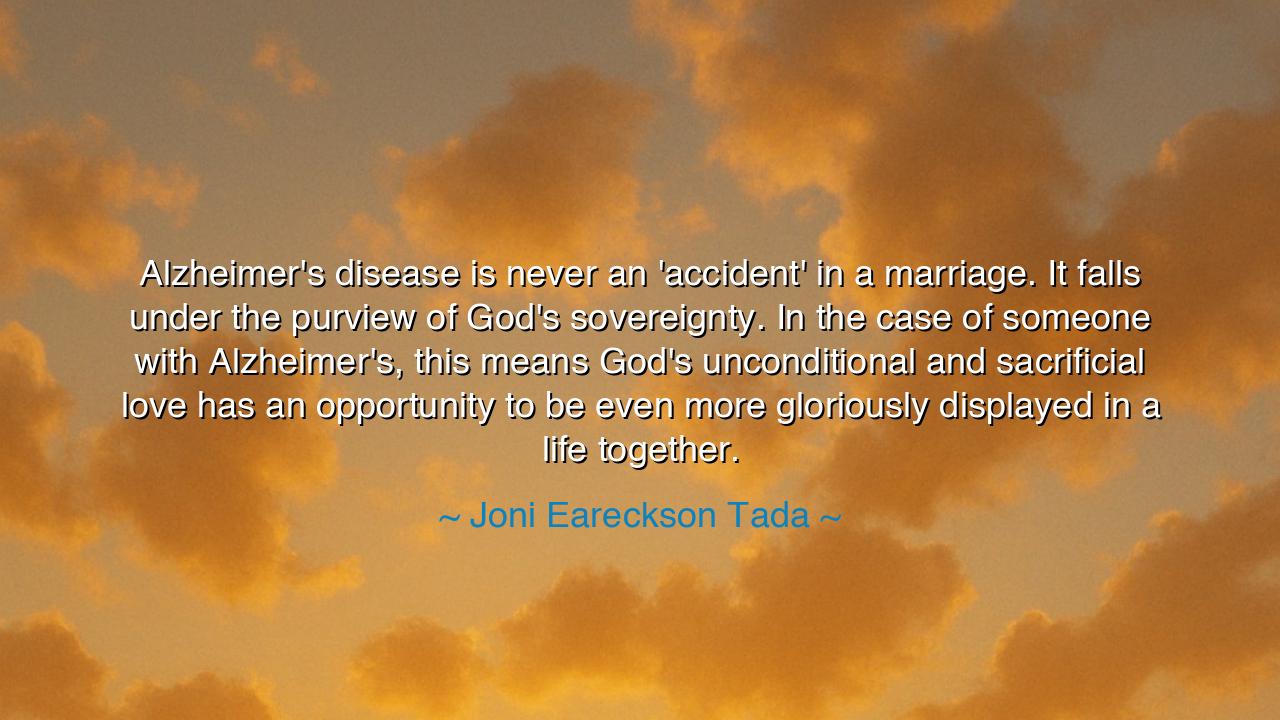
Alzheimer's disease is never an 'accident' in a marriage. It
Alzheimer's disease is never an 'accident' in a marriage. It falls under the purview of God's sovereignty. In the case of someone with Alzheimer's, this means God's unconditional and sacrificial love has an opportunity to be even more gloriously displayed in a life together.






The words of Joni Eareckson Tada, “Alzheimer’s disease is never an ‘accident’ in a marriage. It falls under the purview of God’s sovereignty. In the case of someone with Alzheimer’s, this means God’s unconditional and sacrificial love has an opportunity to be even more gloriously displayed in a life together,” shine with the profound strength of a soul tempered by suffering and faith. They speak of a love that transcends comfort, a love that endures when memory fades, when vows are tested not by passion but by pain. In this reflection, Tada teaches that even the cruelest trials of life — even Alzheimer’s, which erases faces, words, and time itself — are not beyond the reach of divine purpose. She reminds us that marriage, when lived under God’s sovereignty, is not built merely on happiness, but on sacrifice, faith, and the beauty of steadfast devotion.
To understand the depth of her words, we must remember who Joni Eareckson Tada is — a woman who has lived through decades of physical suffering and yet radiates spiritual light. Paralyzed from the shoulders down after a diving accident in her youth, she became a writer, painter, and Christian teacher whose life has been a living testimony to endurance. From her wheelchair, she has spoken of how God transforms suffering into grace. And in this quote, she extends that vision into the heart of marriage, showing that love’s truest power is revealed not in the ease of romance, but in the fires of hardship. To her, Alzheimer’s disease — with all its heartbreak — is not random chaos, but a crucible through which divine love is refined and revealed.
In the ancient world, the sages and prophets also spoke of this kind of redemptive suffering. They taught that when pain enters a covenant — whether between lovers, friends, or nations — it can become the forge of virtue. The Stoics called it anamnesis — the remembrance that even in loss, the soul finds meaning. Likewise, the Scriptures declare that “love bears all things, believes all things, hopes all things, endures all things.” When Tada says Alzheimer’s “falls under God’s sovereignty,” she is echoing this eternal truth: that nothing is wasted in the divine design, not even heartbreak, not even decline. In the silence of forgetting, God gives the faithful a chance to remember what love truly means.
Consider the story of Robertson and Muriel McQuilkin, a modern example of the revelation Tada describes. When Muriel developed Alzheimer’s, Robertson — a respected college president — chose to leave his position to care for her full-time. As her mind faded, she no longer recognized his face, yet he continued to feed her, dress her, and speak to her with tenderness. When asked why, he said simply, “I promised to love her in sickness and in health. She is my delight.” In that devotion, the world glimpsed what sacrificial love looks like — not romantic, not convenient, but holy. Their marriage, stripped of everything but faithfulness, became a living sermon: love without memory, but not without meaning.
Tada’s words remind us that God’s sovereignty does not mean escape from sorrow, but purpose within it. The one who loves someone with Alzheimer’s learns to love without expectation, to give without return. It is a form of divine apprenticeship — learning to mirror the unconditional love of the Creator, who loves His children even when they forget Him. In that forgetting, love itself becomes pure — no longer sustained by emotion or recognition, but by commitment. This is what Tada calls “an opportunity for God’s love to be gloriously displayed.” When the world sees such steadfastness, it sees a glimpse of eternity — of the love that does not die even when the body and mind begin to fade.
This understanding transforms marriage from a contract into a covenant — not an agreement of comfort, but a promise of sanctity. In the ancient sense, a covenant was eternal, sealed in sacrifice, not broken by suffering but fulfilled through it. When a spouse cares for another through illness, they participate in this ancient act of grace. Their service becomes an altar upon which self-interest is laid down, and divine love is lifted up. The marriage that endures Alzheimer’s becomes, as Tada says, a revelation — a visible sign of the invisible God who remains faithful even when His children wander into forgetfulness.
Let this be the teaching for all who hear her words: do not see hardship as an interruption of love, but as its completion. When trials come, do not ask “Why me?” but “What may I learn of love through this?” For every marriage, whether touched by illness or by lesser storms, must pass through valleys to reach the mountaintop of understanding. In that journey, the heart learns that true love is not the thrill of being loved, but the sacred joy of continuing to love.
Thus, Joni Eareckson Tada’s wisdom stands as both comfort and commandment. She teaches that even in the darkness of Alzheimer’s, love need not perish — it can shine brighter, purer, stronger, freed from the bounds of self. And in that shining, the world witnesses something divine: that love, when surrendered to God’s sovereignty, becomes not just emotion but revelation — not just human affection, but the very reflection of heaven’s eternal faithfulness.






AAdministratorAdministrator
Welcome, honored guests. Please leave a comment, we will respond soon